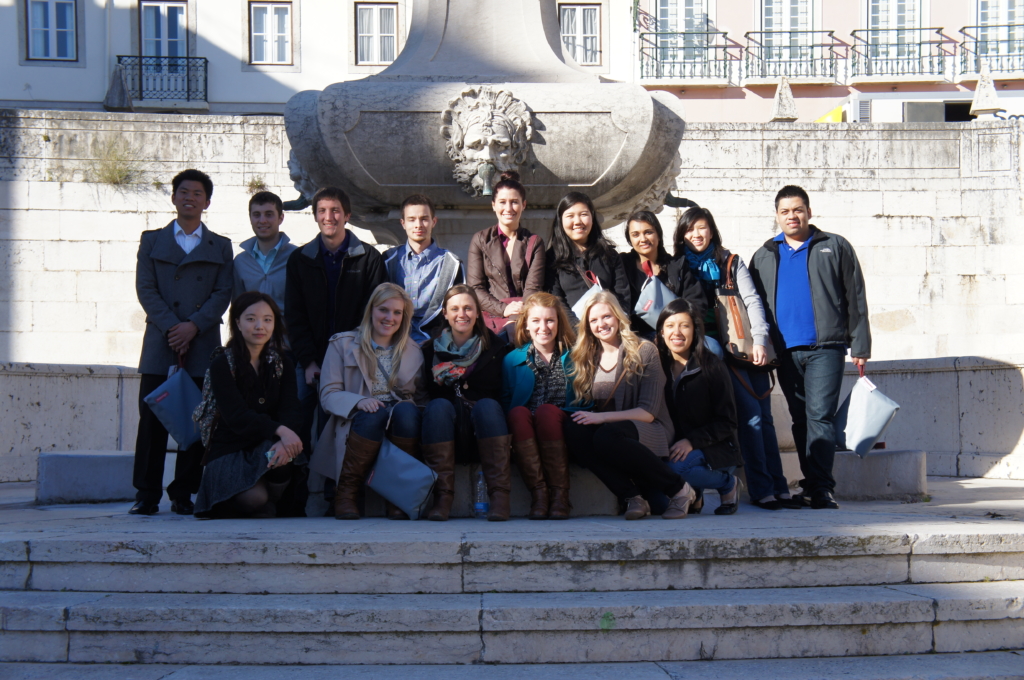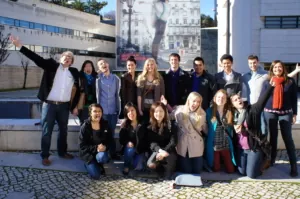
Wolters and Gies students at a company visit in Vienna, Austria.
SET ASIDE TIME TO TRAVEL
Wolters advises students not to stay put in their host city. A big advantage to studying abroad is using it as a launching pad to numerous destinations that will be much more accessible than trying to get to them from home.
Make a list of destinations you want to visit during your study, and make the travel arrangements ahead of time.
“If you have to fly, book your tickets right away,” Wolters advises. If you wait to try to find travel companions, chances are your schedules or desires won’t match and you may end up not venturing out as much as you’d like. If you set your plan, itinerary, and accommodations, more often than not, you’ll find someone later who wants to come along.
You can also sign up for course programs where you travel abroad as a class. These programs typically have extra travel time scheduled outside of designated course work where you can join group outings to nearby cities.
If you do end up traveling alone, no big deal. You’ll get to see what you want to see and eat where you want to eat. Just stay aware of your surroundings, mind any local safety precautions, and do your research ahead of time. Finally, listen to your mother when she warns nothing good happens after midnight, Wolters says.
DON’T LET LANGUAGE BE A BARRIER
Especially for business students, and especially in Europe, English has become the de facto language. The increasingly global nature of business education, and because European students also study at schools outside their native countries at high numbers, most European business schools offer English-speaking courses.
So, don’t let your language skills, or lack thereof, limit your choices of programs, Wolters says. When he was teaching in Portugal, even in classes that were taught in Portuguese, instructors allowed students to write in English.
By the same token, don’t pigeonhole yourself into English-only activities. Wolters learned several languages just by immersing himself in the culture and practicing. Locals appreciate the effort and are usually eager to help.

Students pose in front of a fountain while wandering the neighborhoods of Lisbon after learning about making Portuguese azulejos blue tiles.
UNIVERSITY HOUSING OR HOST FAMILIES
Housing is one of the biggest things people worry about before their adventure, Wolters says. There are basically three options to consider:
- University dorms or student housing: This one of the safest options because it’s been vetted by the university and easily set up through the study abroad program. They’re also typically either close to the host institution or situated near reliable public transportation. Plus, you’ll be living with or near other students so it’s easier to make friends. Cons include they likely have more restrictions on extended-stay visitors, food options may be more limited, and you may be housed with other study-abroad students with less chances to immerse in the local culture.
- Host families: Living with a host family can really help you learn local customs, practice a foreign language, and feel like part of the community. But you will likely have more rules to follow, and the family may live far from campus and make getting to and from campus more cumbersome and expensive.
- Off-campus roommates: While you may have more freedom living with roommates than host families, you face similar struggles getting to and from campus. Plus, making these arrangements can be logistically difficult while still overseas.
He suggests making yourself put your phone away, and get in the habit of saying “yes” to any and all invitations – especially in the first couple of weeks. If locals and other students reach out to you and you decline, they may be less inclined to ask again. Go to the soccer game, or play that game of UNO in an unfamiliar language, even if you’re a bit shy at the start.

Mark Wolters, at right, meets João Duque the president of ISEG, the business school for the University of Lisbon.
“One mistake I think a lot of students make is they get stuck on their phone. They miss their families, they miss their friends, and they want to talk to them all the time or scroll through social media,” Wolters says.
TIPS FOR FAMILIES AND STUDENTS
On safety: One of the biggest worries for parents of students looking to study in another country is whether their children will be safe, Wolters says. His advice: “The university that your child goes to will not send them to someplace that is not safe. They’re gonna make sure the university, the town, and the accommodations are going to be as safe as possible. Because they’re worried too. They’re going to do the same risk assessments they always do.”
And, if something happens on the ground in the destination country, they will make plans accordingly. For example, he knows of study programs in South Korea that were changed to another country when North Korea started testing missiles across the border. Many trips were adjusted during the pandemic to protect students as well.
On financing: As for paying for the chance to study overseas, in some cases it will cost the same as your home institution. For some programs, you’re paying for a student from another country to study at your institution while they are paying for you to study at yours. The biggest expense comes from the extracurricular activities students will almost certainly want to take advantage of while being in a new country: Travelling, site seeing, and participating in local events and get togethers.
On homesickness: Finally, students and parents should realize that in their third month abroad, many students will get depressed, Wolters says. The first month, everything is new and exciting. The second month students are falling into their routine.
“The third month is when they start to miss home. If you’re going to be gone in a fall semester, that’s usually November, and you’ve missed Halloween in the U.S. and Thanksgiving is coming up,” he says. “In spring semester, that’s generally going to be in March.”

Gies and University of Illinois students at the ISEG campus in Lisbon, Portugal.
Make plans to combat homesickness early. Plan a trip, double down on making some new friends, or find a gym if you enjoyed that at home. “There’s all kinds of different clubs that you don’t get in your home country, and that gives you a chance to meet people. Some of the best friends I have in the world I met while I was studying abroad because we had common interests.”
On being open to all possibilities: So, you have a dream destination in mind, but it doesn’t fit with your schedule, needed credits, or finances. Take a chance on a study abroad opportunity you may have otherwise not considered.
“It might not be living in London. It might not be living in Rome. But I lived in a small town in Lithuania and had a fantastic experience and I wouldn’t trade a second of it,” Wolters says. “I can say the same thing about my time in Finland. You may never again get a chance to spend six months in another country just randomly living.”
His biggest piece of advice for students considering a study abroad? Be open to all possibilities, and just go.
DON’T MISS: POETS&QUANTS’ TOP 50 UNDERGRADUATE PROFESSORS OF 2022 AND 2 STORIED B-SCHOOLS MERGE IN THE SAN FRANCISCO BAY AREA











Questions about this article? Email us or leave a comment below.